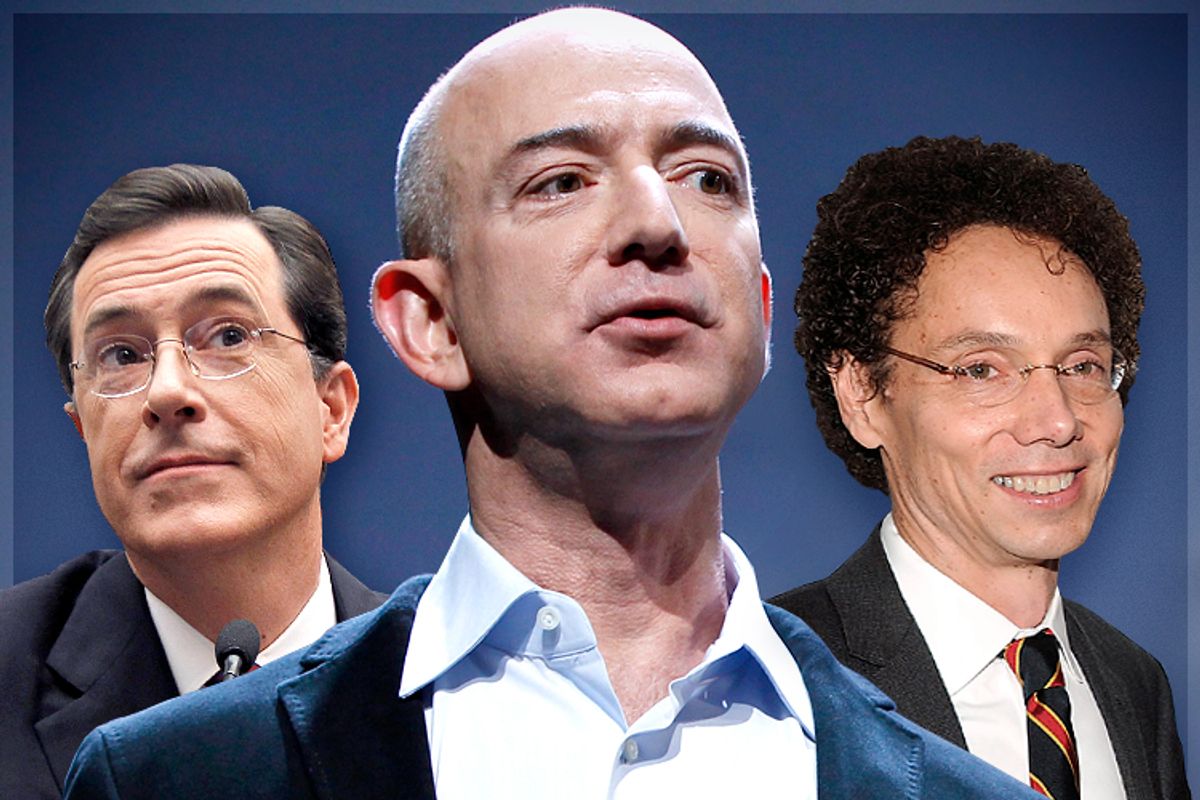Here's what monopoly power means: If you're Amazon, you can ignore the public relations hits that come with blistering front-page stories in the New York Times and stinging opinion pieces, and continue blithely about your business.
So what if the heavy-handed tactics Amazon has deployed in its dispute with the publishing conglomerate Hachette -- delaying delivery of Hachette titles, including offerings by Stephen Colbert and Malcolm Gladwell; eliminating pre-order buy buttons, hiking the prices of Hachette e-books, etc. -- has incited a storm of outrage? Amazon doesn't care.
On May 10, the New York Times reported that, as part of an effort to negotiate better contractual terms from Hachette, Amazon had been for months making it difficult for Amazon users to purchase books by Hachette writers. Books that normally would be delivered in two or three days now required two or three weeks. Banner advertisements on author pages added insult to injury by promoting "similar books for lower prices." Hachette authors exploded in criticism, and even some longtime defenders of the company, like the New York Times technology columnist Farhad Manjoo, called the behavior an "ugly spectacle to behold."
But so far, Amazon hasn't backed down, and that's nothing short of amazing -- not to mention troubling.
Amazon has historically been extraordinarily sensitive to bad press, lest it run the risk of encouraging consumers of its services to think twice about the online giant. Everything Jeff Bezos does, so the story goes, puts the consumer front and center. So when Amazon says -- as it did in a press release this week detailing its side of the business dispute with Hachette -- that "we regret the inconvenience," we're suddenly in new, uncharted, alien territory.
Amazon even advised prospective book buyers to seek better service from its competitors!
The company's enormous self-confidence comes through even clearer at the conclusion of its press release, in the form of a link to an opinion piece that Amazon says "offers a wider perspective" on the issue. The blog post, written by the co-founder of a small literary publisher, attacks the New York Times reporters who broke the story for their "alarmist zeal," calling their article "poppycock" and dismissing the public reaction as a "kerfuffle of rage."
Think about that for a second. To convey its opinion more fully, Amazon directed readers to wildly biased rant. Tell us how you really feel, Jeff Bezos!
The screed does make one useful point by noting how, in the past, chain bookstores and big distributors were hardly angelic in their dealings with publishers. As my colleague Laura Miller noted in her own piece about the Hachette controversy, it wasn't so long ago that the big New York publishing houses were screaming bloody murder about arm-twisting from Barnes & Noble and Borders.
Boiled down to the basics, the fight between Amazon and Hachette is a dispute over contractual terms, with each side wanting a better deal. Nothing could be more normal. Similar fights happen every day in every other industry.
But the fact that it's entirely normal doesn't mean that we should casually dismiss this particular spat. Amazon's influence over the book business is now greater than anything Barnes & Noble ever enjoyed. The retail landscape is vastly different than it was five or 10 years ago. There are far fewer options for buying books. What Amazon's most virulent critics feared has come to pass. Having consolidated its power over the book publishing industry, Amazon is now exploiting it.
If it continues to do so, unchecked by antitrust enforcement or meaningful competition, there's a very real chance that the quality product at the center of all this -- the book! -- will suffer.
The easiest way to understand how this could happen is to take a closer look at the historical business practices employed by Wal-Mart, the closest analog to Amazon in the offline retail space. In his great book, "The Wal-Mart Effect," author Charles Fishman described how every year, Wal-Mart would approach its biggest suppliers and demand they lower the prices they charged to Wal-Mart for their goods.
Wal-Mart's rationale for doing this was all about the consumer. If its suppliers lowered their wholesale prices, Wal-Mart could then lower retails prices in its stores. And we all know how consumers love low prices!
Wal-Mart's suppliers were stuck. Its domination of the retail sector was too overwhelming. Losing a Wal-Mart order could drive a supplier into bankruptcy. But the impact of year after year of being forced to cut your prices by 5 percent was terrible for the product. The suppliers were forced to outsource production to cheaper countries, or cut corners on materials -- or both. Inevitably, the quality of the product declined.
Amazon claims its fight with Hachette is all about being able to give consumers the low prices for books (especially e-books) that they crave. Jeff Bezos' company is following the Wal-Mart game plan word for word. Ultimately, it's not hard to see how the same negative influence will work its way through the publishing ecosystem as it did for BBQ grills and kids bikes. If publishers are forced to charge less for their products, there's less money to go around for advances to writers, for copyediting, for the nurturing of writers over time.
That's the Amazon effect. Consumers will not benefit from badly edited books written by authors who work for peanuts. But that's a future that could very well happen, if Amazon isn't stopped from exploiting its market power to name its own terms in deals with publishers.

Shares